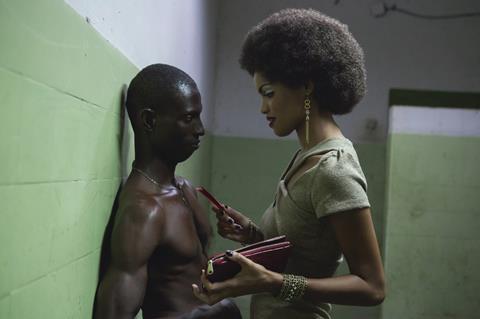Dir/scr: Mahamat-Saleh Haroun. France-Chad. 2013. 101mins

With a thin, undernourished script, mountains of clichés, pale local colour and indifferent performances, Mahamat-Saleh Haroun’s new film is not much of a credit to the African art cinema tradition of Ousmane Sembene and Djibril Diop Mambety. Once his casting was sorted, Haroun - who has won an award in Cannes for his previous film, The Screaming Man - perhaps decided to rest on his laurels and left his two leads, Souleymane Deme and Anais Monory, to fend for their lives in a plot that doesn’t hold much water or makes much sense.
Haroun’s tale has, of course, been told countless times and put into different backgrounds but the particularities of its being placed in Chad, this time are sadly underexploited.
A young, but not very smart, man named Grigris (Deme), who despite a paralysed leg is a remarkably energetic and agile dancer, has to abandon any hopes he might have had of entertaining an artistic career when his stepfather is taken ill. To pay the hospital bills, he has to seek employment with the gasoline traffickers in town.
Praised for his driving expertise that helped him to slip away from under the nose of the police, he decides to go into business on his own, without ever considering the inevitable outcome. He also strikes a sort of relationship with Mimi (Monory), an attractive would-be model selling tricks on the side and she later elopes with him, when his life is in danger. The ending, which should come as a surprise, suggests that once you go back to your roots everything will turn out all right.
Haroun’s tale has, of course, been told countless times and put into different backgrounds but the particularities of its being placed in Chad, this time are sadly underexploited. Though both lead characters are outcasts - Grigris because of his leg and Mimi because she is of mixed blood and has to wear an Afro wig over her straight hair, to hide the origin of her genes - nothing much is made out of it dramatically. They both may be more vulnerable as a result, but it doesn’t affect their behaviour. And if prostitution in Africa is still a subject rarely looked at in films made there, its mention here doesn’t throw much of a light on the subject.
Looking for social or political context, one could point out that the most regular of Mimi’s clients is a white man who doesn’t take no for an answer and that poverty leads to crime…but that would be true not only in Chad, or that the moral fabric in the countryside is much healthier than anything you may find in the city.
Finally, if Souleymane Deme’s skills as a dancer and Anais Monory’s physical attributes are indisputable, their acting is on the bland side and they lack the natural presence that sometimes makes acting almost unnecessary.
Production companies: France 3 Cinema, Republic of Chad Government
International Sales: Les Films du Losange, www.filmsdulosange.fr
Producer: Florence Stern
Cinematography: Antoine Heberle
Editor: Marie-Helene Dozo
Production designer: Ledoux Madeona
Main cast: Souleymane Deme, Anais Monory, Cyril Guei, Marius Yelolo, Hadje Fatime N’goua, Abakar M’Bairo




















